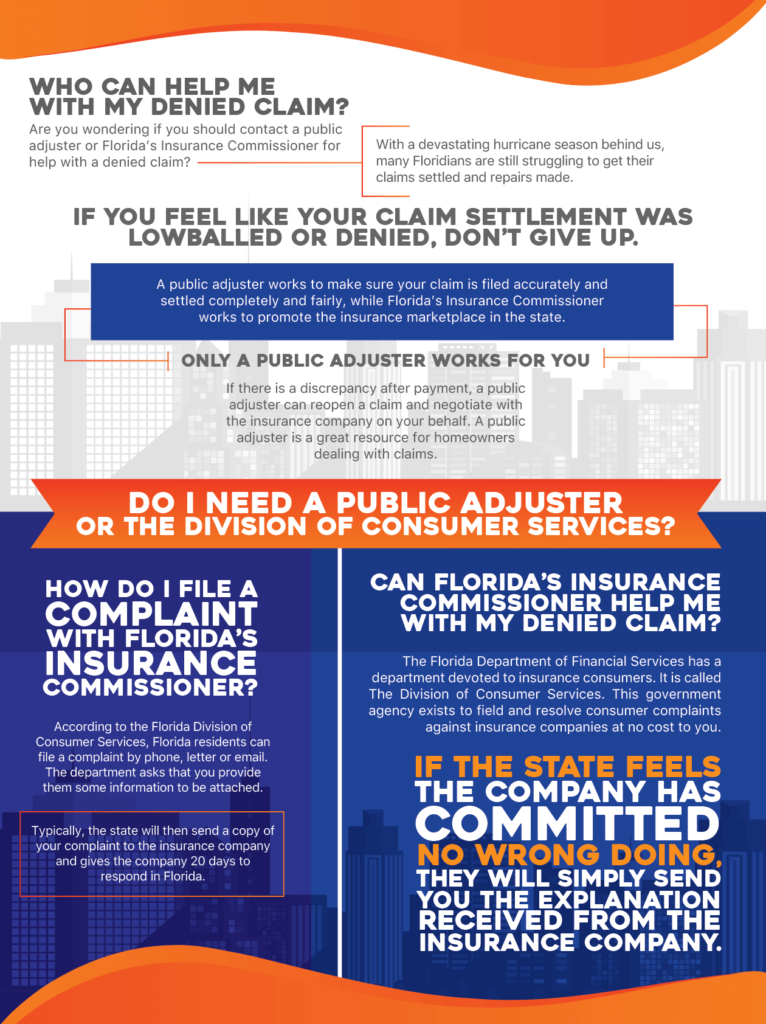Are you wondering if you should contact a public adjuster or Florida’s Insurance Commissioner for help with a denied claim?

With a devastating hurricane season behind us, many Floridians are still struggling to get their claims settled and repairs made.
You may be having trouble getting payment, getting paid enough or even getting your insurance company to respond to your requests.
If you feel like you are being treated unfairly by your insurance company or that your claim settlement was lowballed or denied, don’t give up. There is help available to you.
A public adjuster works to make sure your claim is filed accurately and settled completely and fairly, while Florida’s Insurance Commissioner works to promote the insurance marketplace in the state.
The Division of Consumer Services is part of the Florida Department of Financial Services and is there to field and resolve complaints against insurance companies.
A public adjuster and Florida’s Division of Consumer Services are two resources available to you if you are having trouble with your claim or your insurance company.
If you do need some help with your claim it would be good to know which resource is best for you, and that may depend on the problem you are having and where you are in the claims process.
First let’s talk a little about what a public adjuster does:
Simply put, a public adjuster is an adjuster that works for you – the policyholder. They advocate for you. This is different than a company adjuster or an independent adjuster who works for the insurance company.
A public adjuster is licensed by the state and is the only type of adjuster that can advocate for the needs of the policyholder.
So, for example if you filed a claim with your insurance company, they most likely sent an independent adjuster or a company adjuster to inspect your home. That adjuster works for the insurance company, not for you. Only a public adjuster works for you.
The public adjuster’s main responsibilities are to:
- Read policies and determine if there is coverage for a claim
- Write damage estimates for your dwellings and personal property and other claim related expenses
- Estimate the value of damaged property for settlements
- Prepare and file the claim and handle claim documentation on your behalf
- Negotiate a settlement with the insurance company on your behalf
- If there is a discrepancy after payment, a public adjuster can reopen a claim and negotiate with the insurance company on your behalf

How does a public adjuster get paid?
A public adjuster usually collects a fee that is a percentage of the settlement. Many times, a public adjuster will do a free policy review and inspection to see whether they can help with your claim.
When should I hire a public adjuster?
You will get the most help from a public adjuster if you consult one immediately following a loss. If the public adjuster is involved early in the claims process, they can help make sure the claim is filed correctly and completely. This way, they can help make sure you claim all your damages and receive a fair and complete settlement.
While it is best to hire a public adjuster as soon as possible, one can be helpful at any time during the claims process. They can even help after a settlement has already been made. If you feel like your settlement is too low, a public adjuster can review it for you and even request a claim be reopened.
A public adjuster is a great resource for homeowners dealing with claims. Remember: to get the best outcome, contact a public adjuster as soon as you realize you have a loss.
Can Florida’s Insurance Commissioner help me with my denied claim?
The Florida Department of Financial Services has a department devoted to insurance consumers. It is called The Division of Consumer Services. This government agency exists to field and resolve consumer complaints against insurance companies at no cost to you.
Anyone can file a complaint with the Division of Consumer Services.
If you have exhausted all your resources – company adjusters, public adjusters and other claims staff at your insurance company – and you feel you have been treated unfairly, you may want to file a complaint with The Division of Consumer Services.
How do I file a complaint with Florida’s Insurance Commissioner?
According to the Florida Division of Consumer Services, Florida residents can file a complaint by phone, letter or email.
The department asks that you provide them the following information:
- Policy information – Company, Policy Number or Claim Number
- Contact information – Address and Telephone Number
- Description of the problem or issue
Typically, the state will then send a copy of your complaint to the insurance company and gives the company 20 days to respond in Florida.
If the state feels the company has committed no wrong doing, they will simply send you the explanation received from the insurance company.
If the state does find there is wrong doing, further action is taken. The state can impose fines or even cease and desist orders on insurance companies that are practicing unfair claims handling.
Do I need a Public Adjuster or the Division of Consumer Services?
If you just experienced some type of loss and aren’t sure about how to file a claim or what the next steps are, you may want to contact a Public Adjuster. They are experts in making sure your claim is filed correctly and completely. They also work to get you the best possible settlement.
If you have been offered a settlement and you feel it is to low or your claim has been denied, you should contact a public adjuster to review your claim. They could possibly reopen it for you.
You may need to file a complaint with the Florida Insurance Commissioner or the Florida Division of Consumer Services if you feel like your insurance company has treated you unfairly or did something illegal or unethical.
The Florida Department of Insurance has published a Homeowner Claims Bill of Rights.
This document outlines standards and time frames that insurance companies are required to adhere to during the claims process.
If you feel your insurance company has violated one of these rights, you may want to file a complaint with the Florida Division of Consumer Services.







